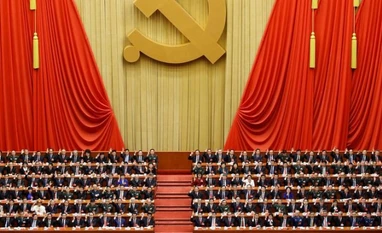China today refuted criticism by a top US Navy official that it has become a "disruptive transitional force" in the Indo-Pacific region and asserted that America should not "speak for other countries".
Commander of the US Pacific Command Admiral Harry Harris, during a panel discussion at the Raisina Dialogue in New Delhi with Indian Navy chief Admiral Sunil Lanba, said: "China is a disruptive transitional force in the Indo-Pacific. They are the owners of trust deficit".
Harris asked how defensive would Vietnam, Malaysia and the Philippines be when China has staked claims on the waters also claimed by the Association of Southeast Asian Nations (ASEAN) nations, comprising the former three countries, in an apparent reference to maritime disputes in the resource-rich South China Sea (SCS).
Harris also spoke of the sense of disquiet among Vietnam, Malaysia and the Philippines in view of the SCS dispute.
He participated in the discussion with Japan's Admiral Katsutoshi Kawano and Australian Navy chief Vice-Admiral Tim Barrett.
Replying to a question on their comments on China's assertiveness, Chinese Foreign Ministry spokesman Lu Kang told reporters that this is not the first time the three have made such comments about China.
Harris has named three ASEAN countries, saying they worried about China's development, he said.
"We did not hear from these countries that they feel worried about China's development. They (the US) should not speak for other countries," Lu said.
Referring to China's multi-billion dollar Belt and Road Initiative (BRI) to improve the connectivity, Lu said: "if some people feel worried about such kind of efforts, the efforts are a destructive force and we can ask those people what make them feel worried?".
China is playing more positive role in the international affairs with initiatives like BRI for public good, he said.
About Kawano's remarks, Lu said Japan should follow up on its promise to improve relations with China.
"China and Japan maintain communication on the East China issue. We hope they can match their words with deeds," Lu added, referring to the bilateral dispute over the islands.
Commander of the US Pacific Command Admiral Harry Harris, during a panel discussion at the Raisina Dialogue in New Delhi with Indian Navy chief Admiral Sunil Lanba, said: "China is a disruptive transitional force in the Indo-Pacific. They are the owners of trust deficit".
Harris asked how defensive would Vietnam, Malaysia and the Philippines be when China has staked claims on the waters also claimed by the Association of Southeast Asian Nations (ASEAN) nations, comprising the former three countries, in an apparent reference to maritime disputes in the resource-rich South China Sea (SCS).
More From This Section
China claims almost all of the SCS. Its claims are contested by the Philippines, Vietnam, Malaysia, Brunei and Taiwan.
Harris also spoke of the sense of disquiet among Vietnam, Malaysia and the Philippines in view of the SCS dispute.
He participated in the discussion with Japan's Admiral Katsutoshi Kawano and Australian Navy chief Vice-Admiral Tim Barrett.
Replying to a question on their comments on China's assertiveness, Chinese Foreign Ministry spokesman Lu Kang told reporters that this is not the first time the three have made such comments about China.
Harris has named three ASEAN countries, saying they worried about China's development, he said.
"We did not hear from these countries that they feel worried about China's development. They (the US) should not speak for other countries," Lu said.
Referring to China's multi-billion dollar Belt and Road Initiative (BRI) to improve the connectivity, Lu said: "if some people feel worried about such kind of efforts, the efforts are a destructive force and we can ask those people what make them feel worried?".
China is playing more positive role in the international affairs with initiatives like BRI for public good, he said.
About Kawano's remarks, Lu said Japan should follow up on its promise to improve relations with China.
"China and Japan maintain communication on the East China issue. We hope they can match their words with deeds," Lu added, referring to the bilateral dispute over the islands.
)